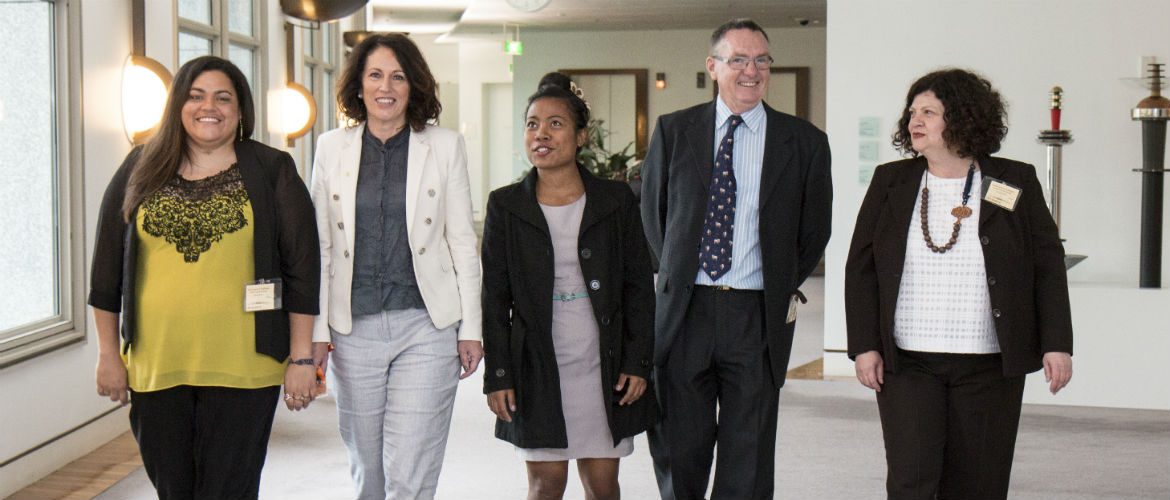
By Juan Martorana, Active Citizenship Communications Coordinator
Twenty-two year old Pacific Islander Tinaai Teaua is currently at the CoP21 climate summit in Paris to ensure her peoples’ future: to conserve their land and guarantee their culture.
“We are very social people, and can still be recognised by our language, especially when we sing and dance,” says Tinaai.
“I love how we are connected to our land and the ocean so intimately. I want to continually practice my culture,” she tells me, “so it won’t be extinct for the future.”
I get it.
I’m sure most people get it.
Tinaai’s hope is that by being in Paris, leaders of the world’s rich and powerful nations will hear voices like hers, and finally they will get it too.
Her message, and that of many people in the Pacific, is that everyone’s long-term “prosperity” — in every sense of the word — can’t be built on short-term thinking that ignores the climate impacts on our land, on our oceans, and on people.
Our response to climate change, our response to the wild winds, the lack of rain, the rising temperatures and sea levels, our response to the dying coral, the crumbling Antarctic, and the hunger, thirst, and the loss of homes, community and culture that this creates; this response needs a deeper think. We need a more comprehensive response. And we need it quickly!
Very quickly, if we are to preserve the land and culture of low-lying Pacific island nations like Kiribati (pronounced keer-uh-bas).
Tinaai is one of at least 40,000 people — incl. those attached to government delegations, and other observers — that are estimated to have descended on the French capital for the 12 days of climate negotiations. But she is only one of 24 people from Kiribati.
The Pacific, including nations like Kiribati, is on the front line of climate change.
“Earlier this year there was a king tide which is higher and stronger than usual,” says Tinaai. “It hit most of the homes in Kiribati; I was so scared. It affects our people emotionally: they live in fear that even higher tides will come and take all their lands.”
“Kiribati is a very small, low lying [group of] islands surrounded by water,” explains Tinaai. “King tides and coastal erosion is affecting our food crops. We depended on breadfruit tree, coconut tree and giant swamp taro. During the king tide they all got destroyed. It also affected our ground water [and] our community people got sick from using this brackish water. The babies got boils on their skin, diarrhoea and so many problems.”
“It was devastating and horrible seeing innocent people suffering the most,” she says.
Tinaai recently joined a group of around 20 Oxfam “Climate Change Makers” who spent time lobbying parliamentarians in Canberra. “I tried to speak powerfully and explain more about Kiribati [to make] it real to ministers so then they would care more. I did this lobbying work to present my people; especially the young people, for [their] future is so a nightmare!”
“Our message to decision makers was we must act now,” says Tinaai.
“Without [this], Kiribati nation very soon will be under water. Losing lands, we lose sovereignty, culture and identity as I-Kiribati; and that is the last thing I could bear in my life.
“I am so happy and proud of those Australians who support us to combat climate change as the biggest issue [facing the world right] now. They are showing the world how to care for [other] peoples; from their work, [comes] more opportunities [for us] to be resilient people and adapt in different ways.
“I don’t want to leave my Kiribati home; it is my identity!” says Tinaai.
Prime Minister Malcolm Turnbull, Foreign Minister Julie Bishop, Environment Minister Greg Hunt and Minister for International Development Steve Ciobo are also in Paris. Send a message to these senior government leaders that they must support our sisters and brothers in the Pacific. They must take stronger action to combat climate change.